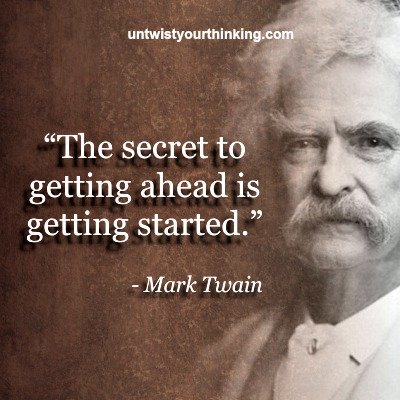Thinking For A Change
Thinking for a change is one thing. Proactive thinking is another. Proactive thinking is somewhat different than positive thinking. It’s not only about thinking for a change in the right direction, It’s about doing. Did you know that you have the power to change your life simply by changing the way you think? Sounds unlikely doesn't it? It really isn't.
When change your thinking you are proactive. Your thinking has the ability to significantly alter the outcome of certain situations. Just think about it. When was the last time optimism helped you overcome an obstacle in your life?
Chances are you put off obstacles ~ deal with them another time. You put things off because you're thinking the worst. When you're thinking for a change, you're changing your thinking and adopting a positive attitude, which can open many doors for you.
You can't change your past,
but you CAN change your future !
Cognitive techniques change twisted thinking to overcome all addictions and negative thinking. They are also effective for couples counseling, relationships and codependency. Counseling with CBT gets results.
Discover the twisted thinking that makes you depressed, angry, impulsive and alters your mood.
When we’re down, we think negative thoughts. These thoughts reflect how we feel and that determines the way we act. So it stands to reason, that how we behave depends on how we think.
No one can ‘make you feel’ anything. We
determine our thoughts by ourselves. In other words only you can think
the way you do – and there’s a positive as well as a negative – so catch yourself in these negative patterns.
Cognitive techniques were pioneered by Aaron T. Beck MD.
Test these forms of twisted thinking on yourself:
Thinking for a change (CBT)
All or nothing thinking:You see things as black or white. There are no gray areas. If it’s not perfect, you see it as a total disaster. ex. You’re dieting and ate a piece of cake. Then you say “what the heck, I’ve blown it”. You’re mad at yourself and you get so upset that you eat the entire cake, feel sick and beat yourself up some more.
Over-generalization:You use words as ‘always’ or ‘never’ when you think dark thoughts. ex. You’ve just broken up with a girl friend and you feel you’ll never find anyone as wonderful – and you get even more depressed.
Mental filter.You obsess over a negative detail and dwell on it. You can obsess about it for days, weeks, months, driving you to feel worse and worse.
Discounting the Positive:If you do a good job you say that it wasn’t good enough or that anyone could have done it. This makes you feel inadequate.
Jump to conclusions: You interpret things negatively without facts to support it. This includes
mind reading (no one can read someone else's mind). Talk to the person clarify the situation.
Fortune-telling: telling yourself that you’re going to blow it, or that you’ll never be any good, when you’re doing well.
Magnification: You exaggerate your problems or shortcomings or minimize your positive attributes.
Emotional reasoning: You believe that the way you feel is the way things actually are. ex. You feel hopeless therefore you must be hopeless. One thing has nothing to do with the other.
Should/must statements: Very important. Thinking ‘should’, ‘ought’, ‘must’ and ‘have to’, make you beat yourself up for not doing the right thing. These words provoke you to rebel by doing the opposite of what you ‘should’ do in the first place. Leave these words out of your thoughts, and create positive strategies.
Labeling:These are negative abstractions leading to anger, anxiety, frustration and low self-esteem. ex. You label yourself an idiot, a jerk, stupid etc. You probably label others as well – a loser, a jerk etc. This makes you angry and hopeless.
Personalization and blame:You hold yourself responsible for something that you can’t control. ex. Your child comes home complaining that he/she has no friends and you interpret that you’re a bad mother. Or the opposite. Blame others. ex. The reason that I had an affair is because my wife is such a nag.
And how many times have you heard someone blame their problems on everybody but themselves??? :)
THINKING FOR A CHANGE & CHANGING
Twisted thinking affects all of us at one time or another, but if your thoughts are frequently distorted, they can cause you, depression, stress, anxiety, anger, fear and many types of addictive behaviors.
For Thinking for a change: Notice your negative thinking. Observe your negative mood.
Changing your thinking can seem simple, but it's harder to do than it appears, because thinking is automatic. I always use CBT techniques with both coaching and counseling clients, you not only learn to recognize your distorted thoughts but to think more optimistically, and also develop strategies to empower you.
Automatically you change your destructive mindset.
It seems magical!!!
These techniques are particularly effective for impulse control behaviors: food, drugs, gambling, drugs, alcohol, codependency, compulsive sex and relationship issues.
They're effective for both adults and teens - and even if you're using medication. Actually cognitive techniques and medication CAN go hand-in hand -- and even better. Depending on the situation, medication can frequently be reduce and even eliminated.
Change your thinking and turn your life around!
"How can I thank you -- I can't seem to find the words that would do justice to say how you've helped me change my life!"
Joanna P/ Scranton, Ohio
For a free 1/2 hr on-line coaching strategy session, let's talk
Think we should talk? 514-400-9375
For powerful Self-help & PERSONAL GROWTH Tips
______________
For Recent articles
|
6 Bullet-proof Ways to Unmuddle Your Life Key Reminders When You Say You're Not Good Enough! |
Tweets by @BeverleyGlazer
Testimonials
Bev Helped Me
Your humor, understanding & insight into my problems helped me beyond my wildest dreams
~ Luella J. NYC
I'm So Grateful
Now I can see how my dysfunctional family members won't change, but the way I handle them certainly has. So Grateful.
~ Steve W. Tokyo
Thank You
Thank you for being there, for guiding us in the right direction and helping us understand and renew a relationship with our daughter. No words can express our gratitude.
~ J.C San Antonio
What A Difference!
You have made a huge difference in my life. I can't thank you enough.
~J.B. Vancouver,B.C
I'm Speechless
I don't seem to find the words that would do justice to all that you have helped me deal with.
~P.L. Sydney, Au
Have a question? Here's where you ask.









